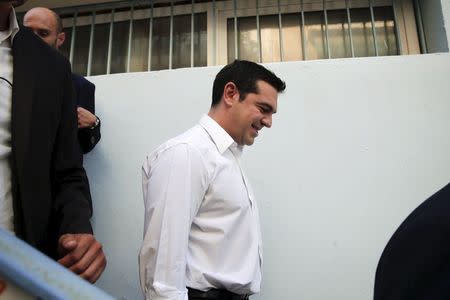Greece's Tsipras faces weary voters after reversal on bailout

By Michele Kambas and John Stonestreet ATHENS (Reuters) - Greek leftist Alexis Tsipras made a last call on Sunday for weary voters to return him to power in a close-fought election, after a tumultuous year that saw him cave in to European demands for austerity to keep the country afloat. Both Tsipras and his conservative rival Vangelis Meimarakis, vying to take on the daunting task of steering the country through a refugee crisis as well as painful economic reforms, called for a high turnout as they cast their ballots in an election polls suggest is too close to call. It is the third time Greeks are voting this year, after an election that catapulted Tsipras and his Syriza party to power and a referendum in which voters backed him to spurn the terms of a bailout - only for him to agree to it anyway. It is also the fifth general election in six years. With many voters disillusioned and exhausted and the major parties in broad agreement about the bailout and there were some signs that turnout might be comparatively light. Tsipras was voted into office in January promising to halt austerity measures imposed by Europe, which most Greeks blame for worsening one of the deepest depressions of any industrialised country in modern times. After banks were shut for weeks and the country pushed to the wall, he effectively reversed himself in August to accept the bailout, splitting his leftist coalition and forcing him to resign and call a new vote. Tsipras' estranged ex-finance minister Yanis Varoufakis, who infuriated Greece's international creditors by refusing to go along with their demands for austerity, dismissed Sunday's election as an attempt to "to nullify" the wishes of Greeks. Many other voters sounded fed up too. "What we are hoping for is for the less useless (politician) so he does the least damage to Greece," said 77-year-old Yiannis outside a polling station in Athens. "I voted, but with a heavy heart," said 29-year old Athens-based researcher Despina Biri. "The bailout is here and now we are only looking for a manager to implement it." Greece's electoral system gives 50 extra seats in the 300-seat house to the party that places first to help encourage stabler governments. Smiling broadly as he voted in a schoolroom in a working-class suburb of Athens, Tsipras urged his fellow citizens to usher in a new era and "give a mandate for a strong government with a four-year horizon, which is what the country needs." NO 'GRAND COALITION'? Final polls on Friday gave a slight edge to Syriza over Meimarakis's New Democracy, but the difference was small and neither party looked in a position to secure the 38 percent or so that should offer a majority of seats. Tsipras has ruled out cooperating with New Democracy and Meimarakis says he will not join a coalition where Tsipras has a top role. So rather than a grand coalition with the other big force, either would probably seek an alliance with smaller parties such as the small centrist To Potami and socialist PASOK. Leaders of both stressed the need for collaboration and stable government. Golden Dawn, a far right party whose leaders have been charged with setting up a criminal organisation, could place third. Such a result would also weigh against the two big parties forming a grand coalition, since that would make Golden Dawn the official opposition, which all mainstream parties say should be avoided. "What I expect is a coalition, a unity government so that it can take the country out of the quagmire that it has been the last years independently of which party comes first," said 40-year-old voter Constantinos Parousias. Sunday's turnout was at a pace that appeared lower than in recent elections. An exit poll is due at 1600 GMT when polling ends, followed by an early vote projection expected by 1800 GMT. Just under 10 million Greeks are eligible to vote. BAILOUT AND MIGRANTS Sunday's winner will need to oversee the deep economic reforms required under the 86-billion-euro ($98-billion) bailout Tsipras was forced to broker in August with Athens' euro zone partners. A large majority of the new parliament is expected to be committed the bailout, but with differences on the margin about how it is implemented. In an interview with Italian daily La Stampa, EU Economics Commissioner Pierre Moscovici said he was confident that whatever coalition emerged would still to the reform programme. "From Monday... we are ready to collaborate to implement the programme to reform the Greek economy," he was quoted as saying. Tspiras argues that his tough negotiations with Europeans softened the blow of austerity and helped secure a promise of debt restructuring that would ease Greece's plight. His opponents say his erratic leadership and grandstanding only prolonged Greece's agony, deepened the economic crisis and obliterated a nascent recovery. Voting in an upper-middle class part of the city, Meimarakis said Sunday was a day of celebration for voters to banish "greyness, falsehoods and misery... and bring in authentic people for a better tomorrow for all Greeks." The new government will also need to handle growing refugee inflows. In a painful reminder of that crisis, 13 migrants died in Turkish waters on Sunday when a boat carrying 46 people en route to Greece collided with a dry cargo vessel and capsized, a Turkish coast guard source said. Greece has been the main gateway for hundreds of thousands of migrants making their way to the EU, triggering border shutdowns and bitter recriminations within the bloc over one of the biggest humanitarian crises in decades. (Additional reporting by Paul Hanna, Renee Maltezou and Gina Kalovryna in Athens, Agnieszka Flak in Milan and Ece Toksabay in Ankara; Writing by John Stonestreet; Editing by Jeremy Gaunt and Peter Graff)

